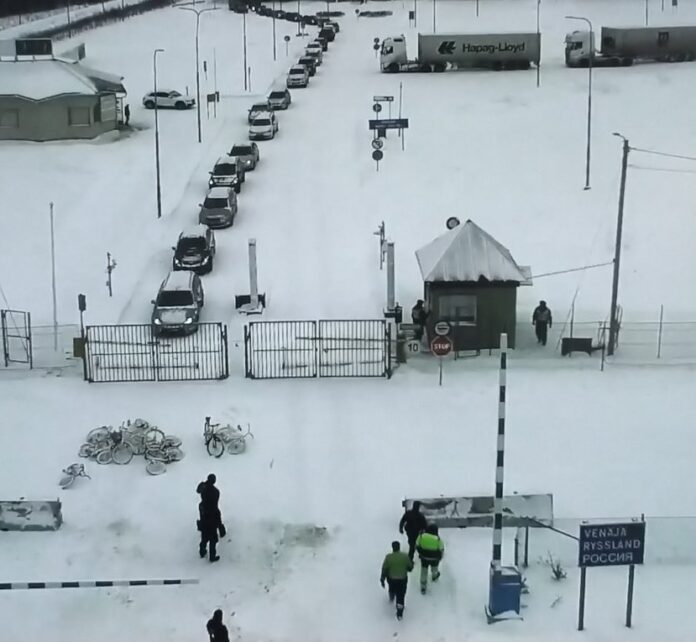A survey commissioned by the Embassy of Finland in Moscow indicates that negative perceptions of Finland among Russians have remained stable compared to the previous year despite a longer-term hardening of attitudes. Some positive views persist, especially among younger people.
The Levada Center conducted the survey from July 25 to 31, 2024. It involved 1,603 Russian adults aged 18 and older and has a margin of error of 3.4%. The results show that 40% of Russians hold a positive view of Finland, up from 37% in 2023, although this improvement is within the margin of error. Long-term trends reveal a decline in positive perceptions: 51% in 2022, 68% in 2021, and 71% in 2019.
Positive attitudes are particularly prevalent among young adults aged 18 to 24, with 61% expressing positive feelings towards Finland, compared to only 29% of those over 55. In 2024, 27% of Russians reported a negative attitude, down from 28% in 2023 and significantly higher than 5% in 2019. Notably, 33% of respondents were unable or unwilling to share an opinion, likely due to a lack of personal experience with Finland, particularly among those living farther from its borders. The Levada Center points out that while traditional positive images of Finland persist for some, negative media portrayals create conflicting views, making it difficult for respondents to form explicit opinions.
‘The decline in Finland’s reputation is rooted in the way Russian state media and propagandists depict the entire West as hostile to Russia. This narrative is tied to the EU sanctions on Russia, Finland’s and Sweden’s NATO membership, and the border closure. We must remember that the deterioration in relations is, of course, due to Russia’s own actions in initiating the war of aggression against Ukraine,‘ says Finnish Ambassador to Moscow Marja Liivala.
Russians’ perceptions of the relationship between Finland and Russia remain similar to last year. In a recent survey, 29% described it as cold, 22% as tense, and 10% as hostile. In contrast, 7% viewed the relations as good, 15% considered them normal and peaceful, while 19% had no opinion.
When asked about actions that could worsen ties, 51% cited NATO bases in Finland, 14% mentioned new sanctions against Russia, and 11% referenced ongoing entry restrictions.
The survey also addressed Finland’s decision to close its border with Russia at the end of 2023. Responses revealed the influence of state propaganda: 38% believed the closure was due to “Russophobic policies“ from NATO, the EU, and the U.S., while 34% attributed it to Finland’s condemnation of Russia’s actions in Ukraine. Only 9% identified the actual reason—migrant movements orchestrated by Russia—while 19% could not provide any reason.
One in three Russians is unaware of Finland’s NATO membership
Many people are unaware of Finland’s NATO membership, with only 65% of Russian adults recognising it. This awareness is 75% among Russian men, but it drops to 54% among those aged 18–24. In Northwest Russia, awareness rises to 80%.
Regarding attitudes towards Finland’s NATO membership, 29% see it as a “fairly significant threat,“ and 35% view it as a “minor threat.“ In contrast, 23% believe it poses “no threat at all,“ while 13% have no opinion. Despite these perceptions, 56% of respondents stated that their attitude towards Finland has not changed, while 39% reported a negative impact on their views.
‘It is somewhat surprising that despite internal propaganda in Russia, one in three Russians is unaware of Finland’s NATO membership. This suggests that Finland is still only one country among many in the eyes of Russians, and we may not occupy Russian minds as much as we sometimes think. For some Russians, Finland is also geographically distant,‘ says Mikko Koivumaa, Director General of Communications at the Ministry for Foreign Affairs.
Surveys by the Ministry for Foreign Affairs in Russia have examined perceptions of the Winter War, a war between the Soviet Union and Finland (1939-40). Currently, 53% of respondents view it as justified from the Soviet Union’s perspective, up from 34% in 2019. This shift is influenced by increased support for Russia’s military actions in Ukraine and efforts to reinterpret history.
For the first time, this year’s survey asked about historical claims regarding Finland in the media. 17% recognised themes such as Finland’s role in the Siege of Leningrad, wartime prison camps in Karelia, and the execution of Soviet prisoners. Additionally, 11% mentioned hearing about ambitions for Greater Finland. However, 58% had not encountered these claims, and 7% were uncertain.

